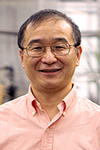
Bing Yang earned B.S. and M.S. degrees in agriculture from Southwest Forestry University in 1986 and 1989, respectively, and a Ph.D. degree in plant pathology from Kansas State University (KSU) in 2000. After working as a postdoctoral associate (2000–2004) and a research assistant professor (2004–2006) at KSU, Yang served as an assistant professor (2007–2013) and then associate professor (2013–2018) in the Department of Genetics, Development and Cell Biology, Iowa State University (ISU). Yang joined the Division of Plant Science and Technology, University of Missouri (MU) as a professor, and the Danforth Plant Science Center as a member and principal investigator in 2018, in a joint employment (50% each) at both institutions.
Over the last 28 years, Yang, his team, and collaborators have identified and characterized many effector genes in Xanthomonas oryzae and host disease susceptibility and resistance genes and elucidated the underlying mechanisms of pathogen virulence and host susceptibility and immunity. He began as a Ph.D. student working with Dr. Frank White, characterizing the structure and functionality of various transcription activator-like effectors (TALEs, formerly named as the AvrBs3 family) in Xanthomonas pathogens of rice. In a landmark work, he demonstrated the DNA binding ability of AvrXa7, a member of TALEs, and identified the first plant disease susceptibility (S) gene (Os8N3, later renamed as SWEET11) and coined the name of TAL effector in another landmark work. Identification and characterization of several paired S or disease resistance (R) genes and TALEs helped decipher the TALE DNA recognition code by the Ulla and Bogdanove groups and invent the TALE nuclease (TALEN) technology for precise genome editing. He has pioneered the development and efficient application of the TALEN technology for genome editing.
In addition to identifying S genes SWEET11, SWEET14, SWEET13, TFIIAγ5, and TFX1, his team and collaborators have cloned the bacterial blight resistance genes Xa23, Xa7, and Xa1 variants (Xa2, Xa14, Xa31, Xa45), and these works have provided mechanistic knowledge of disease resistance or susceptibility mediated through the interactions of these genes. For example, these works revealed how TALEs condition a state of disease susceptibility through transcriptionally activating host S genes or trigger immunity by trapping “Executor" R genes by acting on the EBE (effector binding elements) of these genes. Another significant discovery was the identification of the interfering TALE (iTALE) genes that can not only evade recognition by the NLR type Xa1 and its variants for resistance, but also suppress resistance triggered through the recognition of full-length TALEs by Xa1 and its variants in rice, a unique virulence strategy of bacterial pathogens.
Based on understanding the virulence strategies of the pathogen and the host counteracting mechanism, Yang and his colleagues have demonstrated the feasibility of engineering disease resistance through genome editing. His group created the first gene-edited disease-resistant crop using TALEN technology. In their work, the SWEET14 EBE-specific TALE nucleases were engineered to create the EBE variants of SWEET14, resulting in highly bacterial blight resistant rice lines from the otherwise highly susceptible rice variety. Later, he and his collaborators developed rice lines that become broadly resistant to bacterial blight disease through simultaneously editing the EBEs of three SWEET genes using CRISPR-based multiplex genome-editing technology. Most recently, his group has demonstrated the feasibility of using prime editing, the most advanced gene editing technology, to engineer disease resistance by recapitulating the host resistance mechanisms. Together, Yang's work has enhanced our understanding of the host-pathogen interaction important to rice and other agricultural crops worldwide.
In addition to his impact on understanding the mechanisms of pathogen virulence and host susceptibility and immunity, Yang is known worldwide for pioneering, improving, and applying TALEN and CRISPR/Cas technologies for plant genome editing and precision breeding. His team first demonstrated the feasibility and high efficiency of TALEN-based genome editing and created the disease resistant crop, the first of its kind in the world. Based on the knowledge of TALE AvrXa7 binding to a promoter element of SWEET14, his group designed and engineered TALENs to edit such elements in rice, resulting in site-specific mutations and bacterial blight resistance. Later on, his group and collaborators, by expanding the robustness of CRISPR-based multiplex genome editing and knowledge of other TALEs (PthXo1, PthXo2, TalC, TalF) and disease susceptibility genes (SWEET11, SWEET13, SWEET14), created rice lines showing broad and strong disease resistance. Most recently, Yang's group has utilized the most advanced genome editing technology, prime editing, to demonstrate novel strategies to engineering crop disease resistance. In their work, prime editing has been used to recapitulate the natural allelic function of the bacterial blight resistance gene xa5 by precise base substitution and to revive resistance of dysfunctional R genes in an inducible manner in the otherwise blight-susceptible rice. In addition to rice, Yang's team has established efficient genome editing systems in other crop species, including maize, sorghum, wheat, and soybean.
Yang also has excelled in service to the scientific community. He has contributed to the APS community by serving as a member of the Biotechnology Committee (2009–2011), as a reviewer for the APS journals Phytopathology, MPMI, and Plant Disease, and by participating in various APS elections and surveys. He made his materials and protocols publicly available to a wide number of researchers. Furthermore, he has been training the next generation of scientists through his genome-editing courses and workshops and mentorship of graduate students. He organized and participated in numerous workshops at various meetings. In addition to providing numerous ad hoc reviews, Yang serves on the editorial boards of several prestigious journals, including as editor-in-chief of Molecular Genetics and Genomics, specialty chief editor of genome editing in plants of Frontiers in Genome Editing. Yang shares his expertise by accepting invitations to write reviews and book chapters and provide over 100 presentations worldwide, including keynote and plenary lectures. He is the recipient of numerous awards for his creativity, including the MU Distinguished Research Award (2023), AAAS Fellow (2022), Clarivate Highly Cited Researcher in five years (2019–2023), ISU Outstanding Achievement in Research (2018), ISU Cassling Innovation Award (2017), and ISU Mid-Career Research Award (2013).
